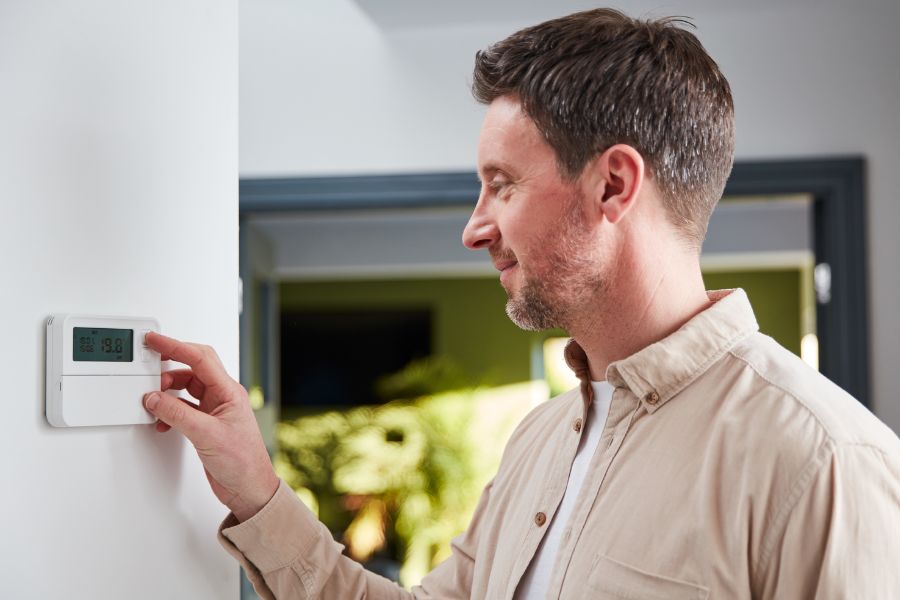Home heating advice
What is the ideal room temperature?
18 Sept 2023 • 5 minutes

Home heating advice
18 Sept 2023 • 5 minutes

Operational Improvement Manager

Put a stop to those family arguments over the thermostat with our definitive guide to finding the ideal room temperature.
Of course, the “ideal” room temperature is subjective, but what we aim to do in this article is offer a breakdown based on the average that people find comfortable.
We’ll look at what seasonal temperature you should be looking to reach to make sure you’re not too hot in the summer and cold in the winter, how to use your central heating to set the right temperature and how to avoid any problems that may occur along the way.
The perfect room temperature can be tricky to achieve, particularly if you live with a number of people. But that doesn’t mean it’s not achievable.
While there is no one-size-fits-all answer, the optimal temperature depends on the individual’s preferences, the season, and your home’s climate.
The first step in finding the ideal room temperature is to determine what temperature is most comfortable for you. Most people prefer temperatures between 20-22°C. If you find yourself feeling too hot or cold, you can adjust the temperature a few degrees up or down to find the ideal level of comfort.
Obviously this can vary room to room as it’s unlikely for example that you’d want your living room and bedroom to be the same temperature. The below table shows the comfort criteria designed by CIBSE’s Guide ‘Environmental Design’ on average, what temperature people want their rooms to be.
| Room | Ideal temperature |
|---|---|
| Living room | 21-23 degrees |
| Bedroom | 17-19 degrees |
| Office room | 20-22 degrees |
| Children’s bedroom | 17-19 degrees |
| Entryway | 19-24 degrees |
| Corridor | 19-24 degrees |
| Bathroom | 20-22 degrees |
| Kitchen | 17-19 degrees |
Generally speaking, the ideal temperature doesn’t change from the figures above, but the biggest challenge is trying to maintain these temperatures depending on the time of year.
It’s more difficult to keep your house warm during the winter, but your thermostat can be used to help create a more comfortable temperature around the house.
A central heating system that works efficiently is crucial to maintaining a comfortable temperature, as this will ensure that your home is heating up as it should be. An easy and effective way to keep your heating running smoothly is to make sure that you have your boiler serviced at least once a year.
There are a few other things you can do to make sure everything is in working order. Firstly, if you’re using radiator covers, there’s a chance that this could be stopping your radiator working efficiently. You can find out more about this in our guide which explains radiator covers and their efficiency.
Secondly, it’s worth making sure that your radiators are working as they should be. For instance, if your radiator is still hot when your heating is off, you will need to get in touch with a qualified Gas Safe registered engineer who can take a look for you.
However, you may find in the summer that you have the opposite problem. In which case you’ll need to look at cooling your room down in hot temperatures.
While you’re likely to be uncomfortable if your room temperature is too high, there’s no serious damage you can cause to you or your home. Obviously, it goes without saying that this is within reasonable limits, and higher temperatures can cause heat stress, especially among the young and elderly.
Of course, you’ll feel uncomfortable, in which case make sure your thermostat and radiators are set to the right temperature and follow our guide on how to cool a room down fast.
If you have the opposite problem and your room is too cold, you could be at risk of problems such as dampness, mould and condensation. This can happen if your heating is off for long periods of time, which can cause longer term problems if left, so it’s definitely worth keep on top of
You can also experience issues such as frozen pipes, which can cause bigger problems with your home further down the line.
More importantly, it’s a good idea that you keep your room at a good temperature to avoid any health problems especially for the elderly. As mentioned on the above table, your living room should ideally be between 21°C – 23°C and your bedroom should be between 17°C – 19°C.
According to NHS guidelines, babies should be in a room with a temperature between 16°C and 20°C.
If you have elderly people in your family, the general rule of thumb is that a living room should be 21°C and above. For a bedroom you should be looking at 18°C and bathrooms should be between 22°C and 24°C.
Obviously it can vary depending on the kind of pet you have, but usually it’s considered that if you are comfortable with the temperature your pet will be too.
According to the NHS, there is no ideal temperature during pregnancy. Many women will say they’re hotter during pregnancy, so it’s more of a case of finding what temperature is most comfortable.
For a good night’s sleep it’s recommended that your room temperature is between 15°C and 20°C, depending on your preference.
In summary, there’s no exact room temperature that you should look to keep your room at. However, there are recommendations that you look to reach to try and bring comfort to your home.
If you’re experiencing temperatures that are too hot or too cold, then there are measures you can take to cool a room down or heat it up.
You can make sure your boiler and central heating system is performing at its best with our boiler cover, meaning that if anything goes wrong, we’re there to help.
Alternatively, if your boiler breaks down, you may want to consider our one-off repairs service which will allow you to call out one of our engineers in an emergency.
Our help & advice articles cover Plumbing, Home heating, Electrical, Energy-saving and Home maintenance.